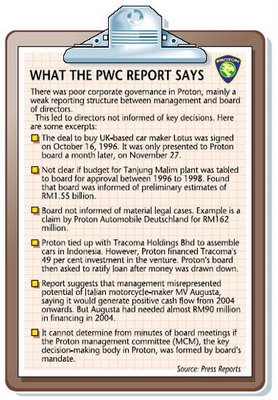Proton has not ruled out any legal action against the previous management after a report may have showed mismanagement from 1996 until late 2005

Legal action a possibility: Proton
July 31 2006
PROTON Holdings Bhd says it is too early to decide whether any legal action would be taken against the previous management after a third party report may have showed mismanagement in the company's affairs from 1996 until late 2005.
However, Proton managing director Syed Zainal Abidin Syed Mohamed Tahir did not rule out the possibility of going to the courts.
"We are looking into details of the matter. For now, it is quite early to say whether there will be legal action," Syed Zainal told Business Times yesterday.
Syed Zainal said the national car maker may come out with a statement today to reply to a PricewaterhouseCoopers report on Proton, which was commissioned by Proton chairman Datuk Mohamed Azlan Hashim and the present management on September 2 last year. Azlan did not answer his mobile phone when contacted.
The report, revealed by a financial weekly and a foreign newspaper, pointed to one conclusion -- Proton's poor corporate governance in the past.
It mentioned some projects that were implemented without proper consultation or consent, billions in expenditure spent without in-depth discussion, and the board being unaware of legal problems.
Syed Zainal, who took office on January 1 this year, way before PricewaterhouseCoopers was hired to investigate Proton's past affairs, tried to downplay any legal outcome against the previous management led by Tengku Tan Sri Mahaleel Tengku Ariff.
"It is natural for the new management to find any weaknessess if it wants to improve the company. We do a lot of reviews on the (company's) current and past operations," he said.
Findings of the reports dated back to October 1996 when Proton bought a 63.75 per cent stake in Lotus Group International Ltd and included those related to investments in the Tanjung Malim plant, Italy's MV Agusta SpA, car ventures in China, PT Proton Tracoma Motors in Indonesia as well as research and development budgets and expenditure and potential troublesome operational issues.




0 Comments:
Post a Comment
<< Home